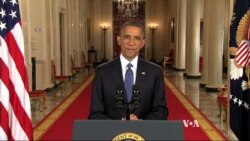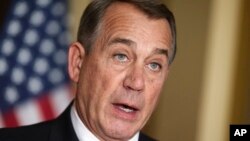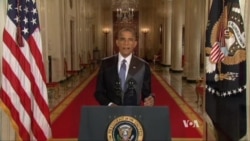President Barack Obama’s controversial decision to protect millions of undocumented immigrants from deportation through executive order carries the prospect of both great political risk and reward.
In his White House address to the nation Thursday evening, the president said that offering millions of immigrants protection from deportation is the morally right thing to do.
“We need more than politics as usual when it comes to immigration,” he said. “We need reasoned, thoughtful, compassionate debate that focuses on our hopes, not our fears.”
The president’s announcement sparked celebrations outside the White House and tears of joy among immigrants at gatherings across the country.
But Republicans saw the decision as a clear political provocation and House Speaker John Boehner promised a strong response in the days to come, though what will be remains to be seen.
“With this action the president has chosen to deliberately sabotage any chance of enacting bipartisan reforms that he claims to seek,” he said. “And as I told the president yesterday, he is damaging the presidency itself.”
Repercussions
Immigration reform opponents warned that the president’s action will have major political repercussions beyond the immigration debate.
“This poisons the well not just for immigration but for anything else getting done,” said Mark Krikorian, executive director of the Center for Immigration Studies. “I don’t see anything getting done in the next two years in large part because of the president’s behavior.”
Analysts said President Obama’s decision was driven in part by delivering on a longstanding political promise to Hispanic activists who played a key role in his election victories in 2008 and 2012.
“He feels incredibly beholden and not just to the activists but I think to the Latino community because Latinos in 2008 and again in 2012 voted overwhelmingly for President Obama," said George Washington University expert Matt Dallek.
But Dallek acknowledged that the president will likely pay a political price in the short term because of the immigration decision.
“I think it does deepen the animosity between not just the executive and legislative branches between Democrats and Republicans and it does kind of further fracture Washington politics,” he said.
At the same time, Republicans must be careful not to offend the growing pool of Hispanic voters in the country, said Thomas Mann, an analyst at the Brookings Institution.
“This is one of the serious issues confronting the country and holding us back and if Republicans are the party of ‘no’ on this, I think the whole country suffers,” he said.
Immigration also figures to be a major issue in the 2016 presidential election and Republican pollster Whit Ayres said his party must do more than simply oppose immigration reform efforts.
“We got one-third of the Hispanic vote,” she said. “We’ve got to do better with Hispanics, with Asians. We’ve seen that coming. It is not arguable and it is simply the challenge that we have to meet successfully if we will ever elect another president.”
Midterm election
The president’s decision to strike out on his own with changes to the immigration system came just a few weeks after his Democratic Party suffered major losses in midterm congressional elections.
Democrats lost their majority in the Senate and Republicans expanded their majority in the House of Representatives, in large part because of the president’s low approval ratings in public opinion polls.
But with his bold and controversial move on immigration, President Obama has taken what may turn out to be a defining moment in his presidency, said James Thurber, the director of the Center for Presidential Studies at American University in Washington.
“I think he is doing it because it is the right thing but he’s doing it because he wants to be known for something,” Thurber said. “Presidents want to have a history where they are known for something and he is certainly going to be known for this, I think in a positive way.”
History’s judgment will come later.
In the near term the president will have to contend with an angry conservative backlash on immigration and the prospect of Republican control of both chambers of Congress come January.
Watch related video report from VOA's Carolyn Presutti at the White House:








